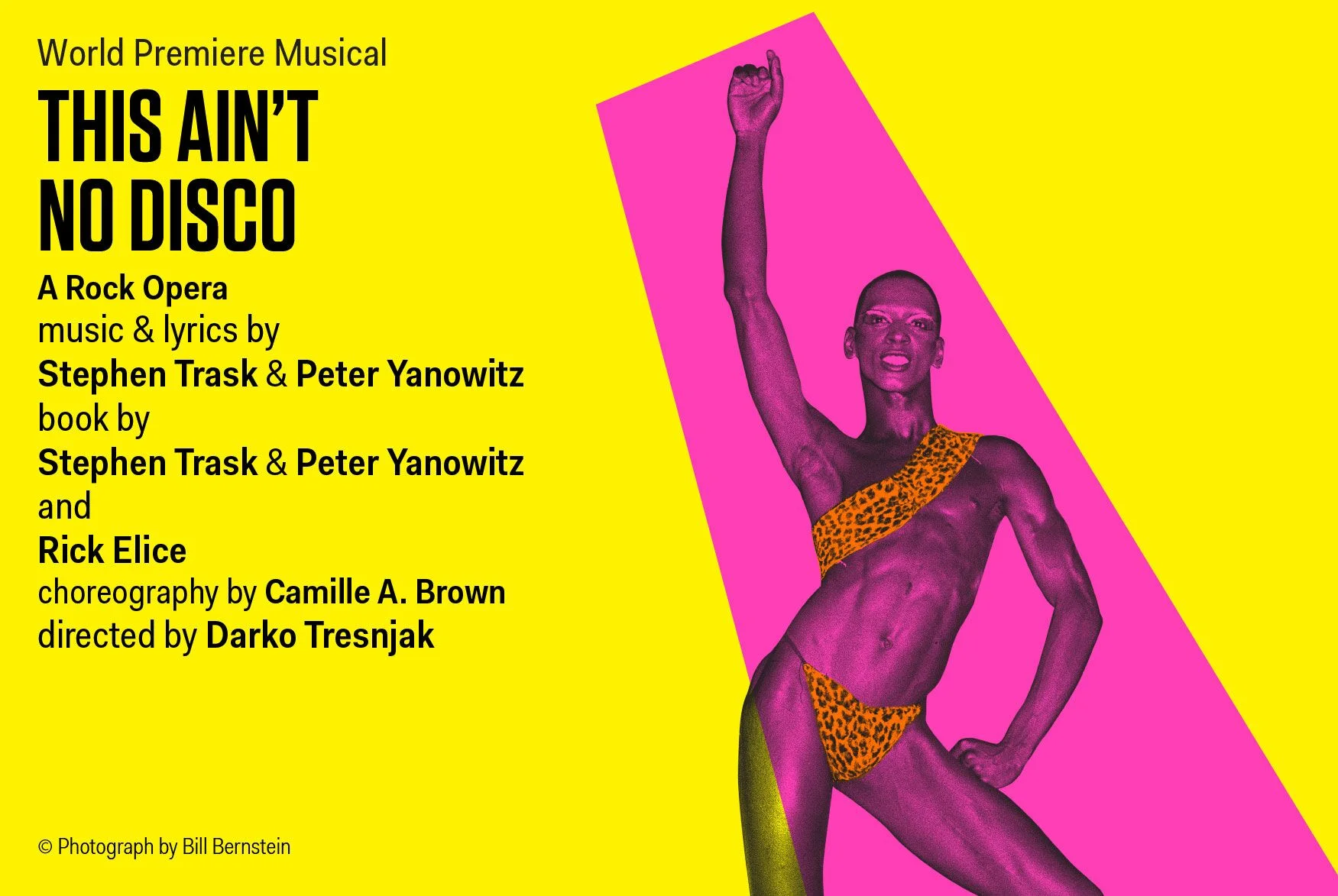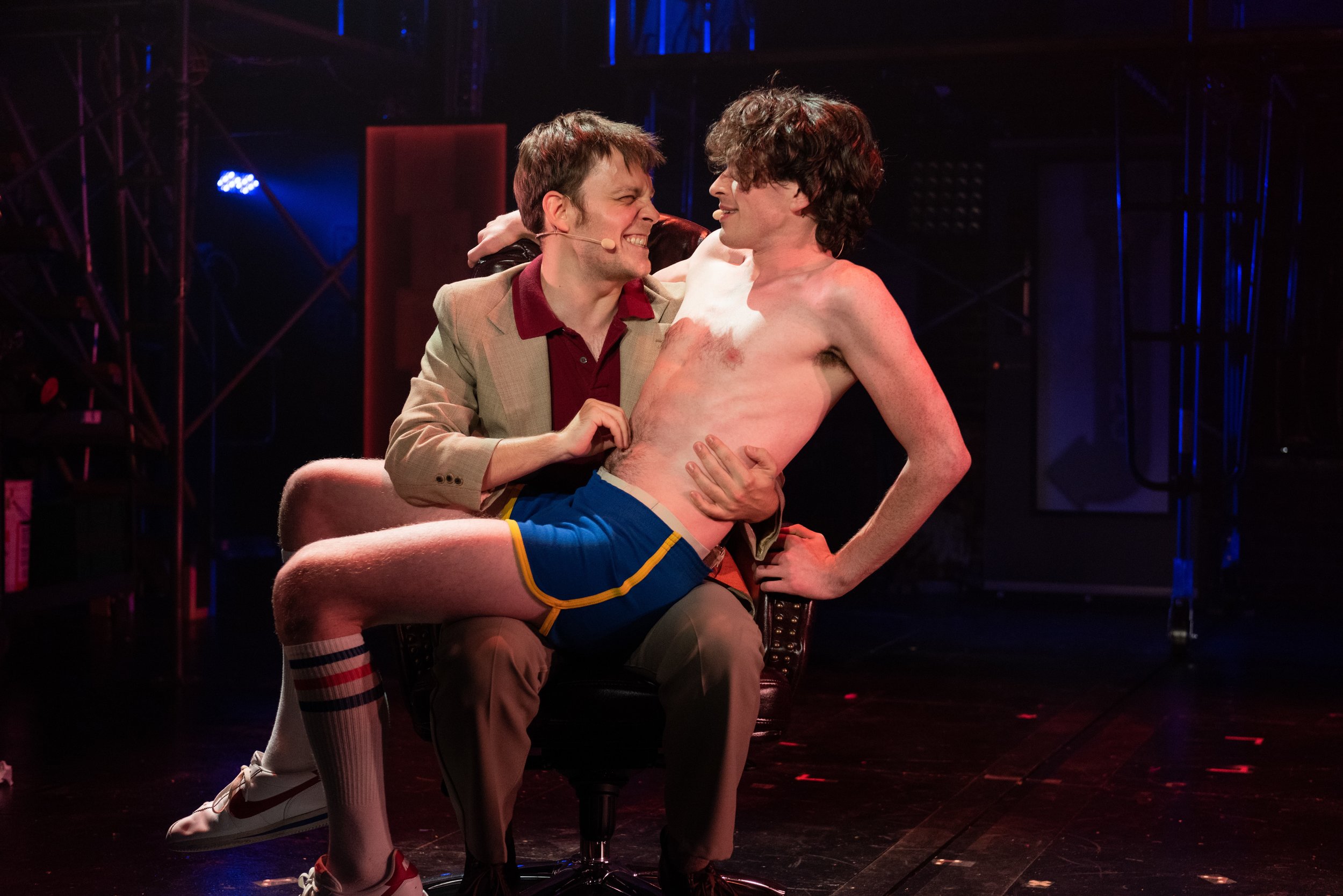REVIEW: “This Ain’t No Disco” Ain’t Kidding
The heady and hedonistic days at the apex of the disco epoch are appealing and gritty grist for a musical. How could an age defined by fluid sexuality, copious drug use, garish opulence, and the irresistible beat of its titular music not be?
Unfortunately, “This Ain’t No Disco”, now playing at the Atlantic Theater Company Off-Broadway, lives up to its title.
A wholly original new rock opera and self-described “impressionist tone poem” set amid the art, music, and dance club scenes of 1979 New York, “This Ain’t No Disco” attempts to encapsulate the essence of that precious moment in American culture and politics—perhaps the last time everyone danced together—when disco reigned and the spirit of sexual self-liberation hadn’t yet come crashing down with the HIV/AIDS epidemic and rise of Ronald Reagan and the conservative right.
Stephen Trask, composer of “Hedwig and the Angry Inch”, and Peter Yanowitz, the original drummer of “Hedwig” and for the Wallflowers, wrote the music, lyrics, and book for “This Ain’t No Disco” with an assist from book writer Rick Elice (“Jersey Boys”), developing the musical over the course of some eight years for this world premiere production under the helm of director Darko Tresnjak (Tony winner for “A Gentleman’s Guide to Love and Murder”) and choreographer Camille A. Brown (“Once on this Island”). The result, however, mostly amounts to a giant yawn.
(l-r) Cameron Amandus, Nicole Medoro, John-Michael Lyles, Krystal Mackie (center), Tony D’Alelio, Hannah Florence, and Ian Paget. Photo Credit: Ben Arons
The show begins as a pseudo-religious nightly ritual unfolds—a bevy of “supplicants” preparing for an evening at Studio 54. As they gather, singing about glory, they bow to their gatekeeper, Steve Rubell, pleading to get past the velvet rope chanting: “let us in, let us sin”. Jason Sherwood’s clever, if occasionally clunky set evokes the street scene with scaffolding and signs ablaze throughout the stage, then transforms past the iconic swinging doors and onto the dance floor of 54.
Here we meet Chad (Peter LaPrade), a 20-something tag-artist runaway twink who gets a gig as one of 54’s famous busboys; Sammy (Samantha Marie Ware), a black, self-harming punk poet from Queens who is a single mother and burgeoning singer; “The Artist” (Will Connolly), a thinly-veiled Andy Warhol, who for some reason (estate disapproval?) is never acknowledged as such; and, of course, Steve Rubell (Theo Stockman), the famously slick and seedy, closeted co-owner of Studio 54 who would end up in prison for tax evasion by 1980 and dead from complications of AIDS by 1989.
(l-r) Theo Stockman as Steve Rubell and Peter LaPrade as Chad. Photo Credit: Ben Arons
Will Connolly as "The Artist". Photo Credit: Ben Arons
Collage-like, the scene shifts to Rubell’s office then swirls to the coat check room where we meet Meesh (Krystina Alabado) and Landa (Lulu Fall) (later coming out as the male Landon), female lovers and artists who play and dream amid the coats of 54’s famous patrons (Baryshnikov! Liza! Dali!), and Binky (Chilina Kennedy), a “pushy Jewish publicist” on the hunt to discover a star.
If you don’t already have whiplash, there’s also the D.A. (Eddie Cooper) and his staffer (Trevor McQueen), who stalk the scene and later bring down Rubell. And an ensemble described as “supplicants”, “revelers”, “the mob”, and “Mudd Clubbers”.
That last moniker is a nod to the Mudd Club—founded by Steve Mass (Trevor McQueen)—one of New York’s first nightclubs for underground music and counterculture events in the late seventies and early eighties.
The cast of "This Ain't No Disco". Photo Credit: Ben Arons
Among its many aims, “This Ain’t No Disco” sets out to explore the dichotomous tension between the uptown glitz of Studio 54 and the downtown grit of the Mudd Club, and the confluence of art and commerce at the time as represented by the puppet-mastery of “The Artist” and Binky. Like so much in this musical, overstuffed with plotlines, characters, stories, and themes, that exploration is relegated to not much more than a tangent referenced atop Act II, and a vague idea hovering throughout the balance of the show.
I get the sense that Mr. Trask and Mr. Yanowitz discovered too many things they wanted to say and so much extraordinary history they wanted to mine and share. The result is that "This Ain't No Disco" tries to be everything—a coming of age story in Chad’s arc, a queer love story with Meesh and Landon, a study of the disco and proto-punk scenes, a celebration of art and music, a condemnation of sensationalist celebrity—and ends up being not much of anything.
“This Ain’t No Disco” most closely resembles Boy George’s “Taboo”; like that musical, it struggles with narrative clarity and balancing demonstration of a specific club scene with dramatic investigation of its characters and their milieu. This is a musical that desperately wants to exist on the dance floor of Studio 54, but must, of necessity, keep branching out to other locations and scenes, since life in all its messy totality is not lived on a dance floor.
In so doing, with a rampant cacophony of characters, ideas, and issues floating around, there is little development and no satisfying build, only a sprawling, shallow story that is neither unique, distinctly tethered to the history of the setting, or frankly, engaging.
Mr. Trask and Mr. Yanowitz have spun a catchy, if anachronistic score, though their lyrics, as is often the case with rock operas, are baldly expository and often repetitive. The character of Sammy, who becomes a sudden music sensation, has no consistent musical idiom undergirding her success, which is confusing given the uptown/downtown scenes that she straddles. Is she punk? Is she rock? She sounds more R&B or, dare I say, Broadway. Everyone, it turns out, is an artist—years of struggle compressed to mere minutes. I didn’t care about a single character.
Ms. Brown’s choreography is abrasively hyper, and the clean cut, smooth-chested ensemble reads decidedly more 2018 than 1979. Indeed, among the many global problems of “This Ain’t No Disco”—and there are many—is the failure to establish a consistent, convincing world for its characters to inhabit.
Chilina Kennedy as Binky. Photo Credit: Ben Arons
Samantha Marie Ware as Sammy. Photo Credit: Ben Arons
Most of the effort is tonally uneven as camp and parody (see: Steve Rubell/Studio 54 scenes/every line of Binky’s) clash with attempts at more serious, heartfelt storytelling (Sammy’s cutting, rape, and addiction; Chad working as a prostitute). A musical about a time of such penetrating, ecstatic life being lived is bland and soulless, overstuffed, overdone, and under-dramatized.
I admire the desire and ambition of “This Ain’t No Disco”. On the heels of a lackluster Broadway tribute to Donna Summer, the unquestioned Queen of Disco, I am starting to believe that the disco era might never be properly dramatized on stage. If nothing else, “This Ain’t No Disco” is not just a flop, but a belly flop, the kind you just don’t see that often on stage in New York anymore.
The characters might want so desperately to be let in, but I suspect you—like me—will just want out.
Bottom Line: “This Ain’t No Disco”, an original rock opera about the art, music, and dance club scenes of 1979 New York, ain’t kidding. This new musical is bland and soulless, overstuffed, overdone, and under-dramatized, with a cacophony of characters, ideas, and issues offering only a sprawling, shallow story that is neither unique, distinctly tethered to the history of the setting, or frankly, engaging. This isn’t just a flop, but a belly flop—the likes of which you rarely see on stage in New York anymore.
_______________
“This Ain’t No Disco”
Linda Gross Theatre
Atlantic Theater Company
336 West 20th Street
New York, NY 10011
Running Time: 2 hours, 30 minutes (one intermission)
Opening Night: July 24, 2018
Final Performance: August 12, 2018
Tickets







